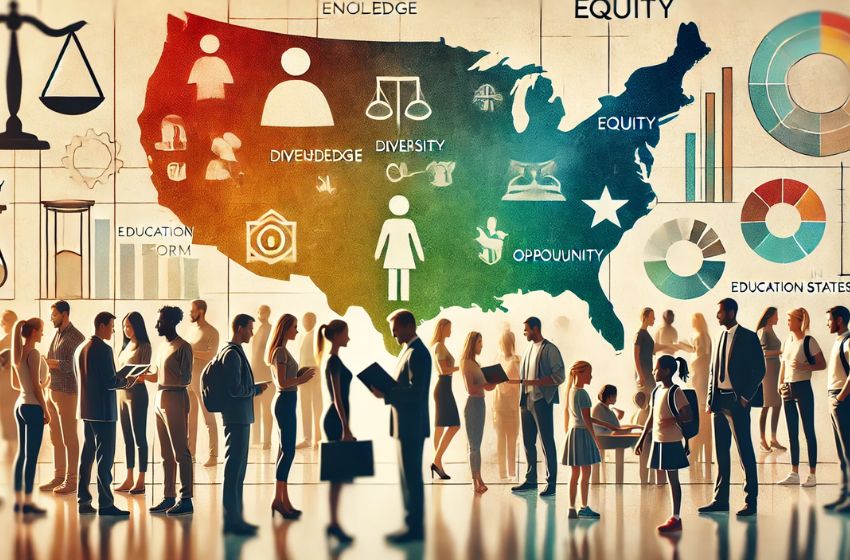Welcome to another in-depth exploration here at Wisto Journal, where we tackle some of the most pressing topics in education. Today, we’re looking at 21 reasons not to rank states education radical eyes equity,” a critical issue that questions the traditional approach of ranking states’ education systems. This article will break down why it’s time for a shift in mindset towards equity, diversity, and fairness in education rather than merely comparing state performances through arbitrary rankings.
Let’s dive deep into the 21 reasons why ranking states’ education may do more harm than good, especially when viewed through a radical lens of equity.
1. Rankings Are Misleading
One of the primary reasons not to rank states’ education is that rankings can be misleading. They often don’t account for significant differences in resources, socioeconomic factors, and student populations. In fact, they simplify complex educational environments into a one-size-fits-all model, which undermines the efforts of many schools striving for equity. Equity-focused initiatives at Wisto Journal believe in taking into account the diversity within educational systems rather than relying on blanket rankings.
2. Rankings Ignore Socioeconomic Disparities
Ranking systems tend to overlook the socioeconomic disparities between states. Wealthier states often have more resources to dedicate to education, resulting in higher scores. Meanwhile, states with a larger proportion of low-income students struggle to meet these metrics, which fuels inequity. A radical equity approach demands a more nuanced understanding of the relationship between poverty and educational outcomes.
3. Reinforces Existing Inequality
Rather than reducing inequality, ranking states perpetuates existing disparities. High-ranking states attract more funding and top teachers, while lower-ranking states may suffer from a lack of resources. This further deepens the education gap between states.
4. Encourages a Test-Driven Culture
Ranking states’ education often relies on standardized test scores as a primary measure of success. This test-driven culture pressures schools to “teach to the test,” which undermines creative and critical thinking. A radical eyes equity approach, as we discuss here at Wisto Journal, pushes for diverse learning assessments that recognize varied student talents beyond just test scores.
5. Fails to Address Unique Challenges
Each state faces its own unique challenges, whether they are demographic shifts, rural isolation, or urban overcrowding. Ranking states ignores these differences and holds each state to the same standards, which is neither fair nor equitable.
6. Discourages Innovation
When states are focused on climbing the rankings, they may prioritize short-term gains in test scores over long-term innovation and sustainable reforms. An equity-based approach promotes creative solutions and reforms tailored to local needs, rather than focusing on how to rank higher.
7. Focuses on Competition, Not Collaboration
Ranking states promotes a competitive culture among states, schools, and students. But in education, competition shouldn’t be the goal. Instead, collaboration among states and schools to share best practices and resources is more beneficial. The Wisto Journal encourages educational systems to focus on sharing knowledge rather than striving for arbitrary rankings.
8. Oversimplifies Education Systems
Education is complex and multifaceted, and rankings reduce this complexity to a single number. This simplification is not only unfair, but it also fails to provide meaningful insights into how to improve education for all students.
9. Fails to Consider Teacher Quality
Another issue with ranking systems is that they often don’t measure teacher quality. States with lower rankings may have excellent educators who are achieving remarkable results with fewer resources. Equity requires valuing teacher quality over test scores alone.
10. Ignores Student Well-being
Ranking systems focus heavily on academic performance and often ignore factors like student well-being, mental health, and emotional growth. A more equitable approach would recognize the importance of nurturing well-rounded students.
11. Fuels the “Race to the Top” Mentality
Rankings often create a “race to the top” mentality that prioritizes being the best over being equitable. This race can drive states to adopt quick-fix solutions rather than systemic changes that promote long-term equity in education.
12. Increases Pressure on Low-Performing Schools
Low-ranked schools face additional pressure, often leading to punitive measures like budget cuts or closures. Instead of being supported, these schools are further marginalized. Radical eyes on equity would call for additional support, not punishment, for struggling schools.
13. Penalizes Diversity
States with diverse student populations may find themselves penalized in ranking systems. But diversity should be celebrated, not seen as a barrier to achieving high scores. Equity demands that we view diversity as a strength.
14. Doesn’t Account for Local Policy Differences
Education policies vary from state to state, and ranking systems fail to consider these differences. A radical equity perspective would argue for evaluating states based on their specific policies and needs rather than comparing them against a universal standard.
15. Limits Focus on Special Education
Students with special education needs often get lost in the shuffle when states are ranked based on general performance metrics. An equitable education system would ensure that students with disabilities are given the same attention and resources as their peers.
16. Misses Out on Cultural Differences
Cultural differences between states can impact education systems in profound ways. Rankings often disregard these factors, leading to incomplete and skewed evaluations. Focusing on equity requires considering the cultural context in which education takes place.
17. Leads to Short-Term Thinking
When states are focused on improving their rankings, they may adopt short-term solutions that don’t benefit students in the long run. Equity-based reforms, however, are built around sustainable and inclusive improvements.
18. Stigmatizes Struggling Schools
Rather than helping struggling schools, ranking systems often stigmatize them. These schools are labeled as “failures,” which can lead to decreased morale among students, teachers, and the community. A radical equity perspective advocates for supporting struggling schools, not labeling them.
19. Undermines Local Control
Ranking states undermines local control over education. Local communities know what their students need, but rankings push states toward one-size-fits-all solutions. A focus on equity respects local decision-making and diverse approaches to education.
20. Promotes Inequitable Funding
Higher-ranked states often receive more federal funding, while lower-ranked states, which may need it most, receive less. This creates a vicious cycle of inequity that is hard to break.
21. Undermines the Goals of Public Education
At its core, public education should be about providing equitable opportunities for all students to succeed. Ranking states shifts the focus away from this goal and toward a narrow definition of success. A radical equity perspective calls for a reimagining of what success in education looks like, prioritizing fairness, inclusion, and diversity over rankings.
In conclusion, Wisto Journal believes that the time has come to move beyond ranking states’ education systems. By focusing on equity and diversity, we can create a more just and fair education system for all students, regardless of their background or where they live.



